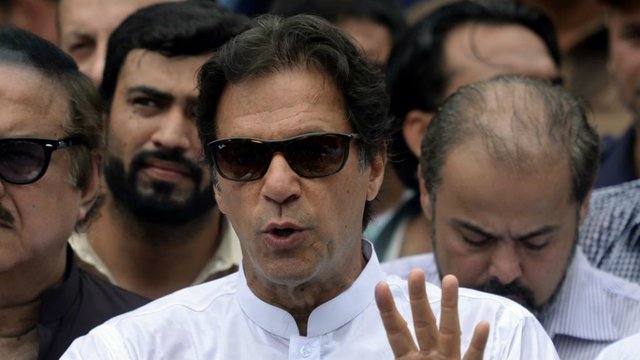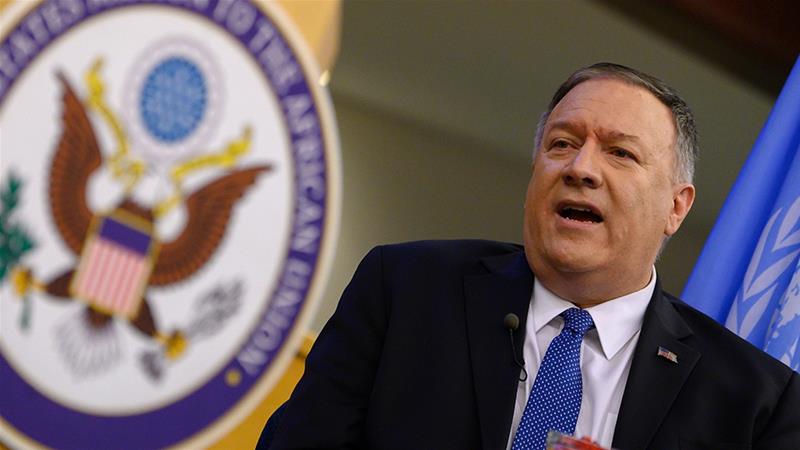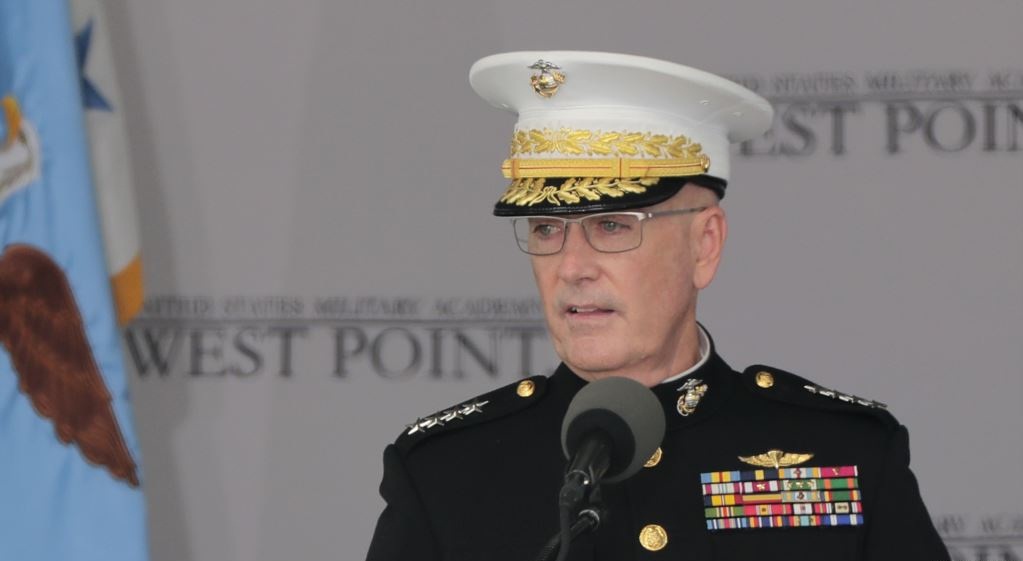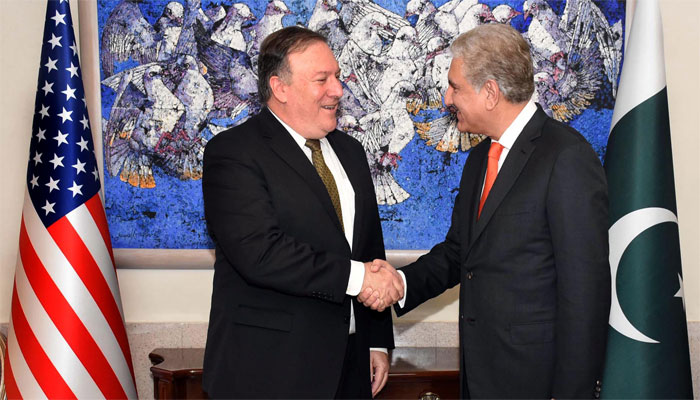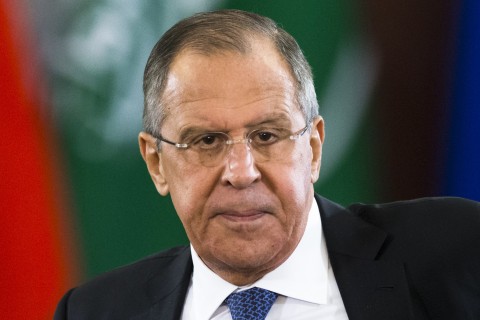It will be a miracle if Wednesday’s meeting in Islamabad between Secretary of State Mike Pompeo and new Pakistani Prime Minister Imran Khan goes smoothly. Pre-meeting diplomacy has been less than diplomatic.
Publish dateWednesday 5 September 2018 - 15:30
Story Code : 170121
AVA- It started with Pompeo’s first telephone call to Khan, whose party was the largest party after nationwide elections last month. A brief single paragraph read out of the Aug. 23 conversation included the line, “Secretary Pompeo raised the importance of Pakistan taking decisive action against all terrorists operating in Pakistan.” Islamabad responded furiously, denying that the issue even had been mentioned, but quieted after the State Department let it be known that a transcript of the conversation was sent to Islamabad.
Then on Aug. 30, Pakistan welcomed Iranian Foreign Minister Mohammad Javad Zarif to Islamabad for two days of talks. Khan expressed “unequivocal” support for Iran’s position on the 2015 nuclear deal from which Washington has withdrawn. He also took the opportunity to pass thanks to Iranian Supreme Leader Imam Ali Khamenei for his support for the struggle of the people of Kashmir for self-determination. (Much of the Muslim-majority state of Kashmir is controlled by neighboring India.)
Washington’s next move was to announce the cancellation of $300 million of military aid. The decision had been made earlier but was confirmed publicly last weekend, perhaps to show irritation at the Zarif visit. The cut impacts directly on the Pakistan army, the dominant force in national politics whose quiet backing of Imran Khan in elections is credited with pushing him to victory.
Notionally, Wednesday’s meetings are for Secretary Pompeo, accompanied by Chairman of the Joint Chiefs of Staff Gen. Joseph Dunford, and their Pakistani counterparts — Foreign Minister Shah Mehmood Qureshi and Chief of Army Staff Gen. Qamar Javed Bajwa. But both Americans also are due to meet Khan, a former cricket star and playboy who since has become deeply religious, and previously has spoken out against American strikes against the Taliban in Afghanistan.
The focus of all the discussions likely will be about Afghanistan, where the deaths of the sixth and seventh American service members this year have just been reported, as well as Pakistan’s attitude towards terrorism, which often is considered ambiguous at best. (The founder of the Haqqani network, an Afghan terror group reportedly supported by Pakistan's feared Inter-Services Intelligence — ISI — has just died after a long illness. The group is now led by his son.)
A historical dark cloud over the proceedings almost certainly will be Osama bin Laden, who lived for several years within a mile of Pakistan’s most prestigious military academy until killed in a raid by U.S. Navy SEALs in 2011. Another awkward detail in bilateral ties has been the nuclear proliferator Dr. A.Q. Khan, who, with at least some official connivance, provided enrichment technology to both Iran’s and North Korea’s nuclear programs. Khan (no relation to the prime minister) is now 82, living as a free man in an Islamabad suburb, but his legacy is central to current American foreign policy concerns.
Pompeo’s and Dunford’s challenge will be to balance continuing American reliance on a land route through Pakistan to supply its recently reinforced forces in Afghanistan with the known perspectives of President Trump, whose first tweet of 2018 said that U.S. aid to Pakistan had achieved “nothing but lies and deceit.”
Pakistan’s foreign minister has said he expects “exchanges” at the meetings, but to minimize confrontation, Khan may ask for more time to settle in to his new role. This has been his line to domestic audiences, with whom he has sought a three-month grace period before his new government is criticized. Whether this is an indication of his naïveté, or a realization of the huge challenges his administration faces, is not clear. Maladministration has left a massive budget deficit, and the country looks like needing International Monetary Fund (IMF) assistance very soon.
Khan may decide to claim he has a China option to balance or replace his nation’s ties with the United States. He also may say he favors developing relations with Iran, including importing natural gas, a project Washington has been trying to block for years. His most influential adviser, though not necessarily the best, will be his army chief, Gen. Bajwa. The two men have met three times in the past week. We have yet to see whether Khan will be Bajwa’s pupil or pawn.
Today, the National Assembly and four provincial assemblies voted to choose a new president of Pakistan, the nation’s head of state, though not of government. The selection of the anticipated winner, Arif Alvi from Khan’s own party, will be a boost to the prime minister’s standing.
No doubt President Trump will want to hear of progress following the Islamabad talks. He shouldn’t hold his breath.
Then on Aug. 30, Pakistan welcomed Iranian Foreign Minister Mohammad Javad Zarif to Islamabad for two days of talks. Khan expressed “unequivocal” support for Iran’s position on the 2015 nuclear deal from which Washington has withdrawn. He also took the opportunity to pass thanks to Iranian Supreme Leader Imam Ali Khamenei for his support for the struggle of the people of Kashmir for self-determination. (Much of the Muslim-majority state of Kashmir is controlled by neighboring India.)
Washington’s next move was to announce the cancellation of $300 million of military aid. The decision had been made earlier but was confirmed publicly last weekend, perhaps to show irritation at the Zarif visit. The cut impacts directly on the Pakistan army, the dominant force in national politics whose quiet backing of Imran Khan in elections is credited with pushing him to victory.
Notionally, Wednesday’s meetings are for Secretary Pompeo, accompanied by Chairman of the Joint Chiefs of Staff Gen. Joseph Dunford, and their Pakistani counterparts — Foreign Minister Shah Mehmood Qureshi and Chief of Army Staff Gen. Qamar Javed Bajwa. But both Americans also are due to meet Khan, a former cricket star and playboy who since has become deeply religious, and previously has spoken out against American strikes against the Taliban in Afghanistan.
The focus of all the discussions likely will be about Afghanistan, where the deaths of the sixth and seventh American service members this year have just been reported, as well as Pakistan’s attitude towards terrorism, which often is considered ambiguous at best. (The founder of the Haqqani network, an Afghan terror group reportedly supported by Pakistan's feared Inter-Services Intelligence — ISI — has just died after a long illness. The group is now led by his son.)
A historical dark cloud over the proceedings almost certainly will be Osama bin Laden, who lived for several years within a mile of Pakistan’s most prestigious military academy until killed in a raid by U.S. Navy SEALs in 2011. Another awkward detail in bilateral ties has been the nuclear proliferator Dr. A.Q. Khan, who, with at least some official connivance, provided enrichment technology to both Iran’s and North Korea’s nuclear programs. Khan (no relation to the prime minister) is now 82, living as a free man in an Islamabad suburb, but his legacy is central to current American foreign policy concerns.
Pompeo’s and Dunford’s challenge will be to balance continuing American reliance on a land route through Pakistan to supply its recently reinforced forces in Afghanistan with the known perspectives of President Trump, whose first tweet of 2018 said that U.S. aid to Pakistan had achieved “nothing but lies and deceit.”
Pakistan’s foreign minister has said he expects “exchanges” at the meetings, but to minimize confrontation, Khan may ask for more time to settle in to his new role. This has been his line to domestic audiences, with whom he has sought a three-month grace period before his new government is criticized. Whether this is an indication of his naïveté, or a realization of the huge challenges his administration faces, is not clear. Maladministration has left a massive budget deficit, and the country looks like needing International Monetary Fund (IMF) assistance very soon.
Khan may decide to claim he has a China option to balance or replace his nation’s ties with the United States. He also may say he favors developing relations with Iran, including importing natural gas, a project Washington has been trying to block for years. His most influential adviser, though not necessarily the best, will be his army chief, Gen. Bajwa. The two men have met three times in the past week. We have yet to see whether Khan will be Bajwa’s pupil or pawn.
Today, the National Assembly and four provincial assemblies voted to choose a new president of Pakistan, the nation’s head of state, though not of government. The selection of the anticipated winner, Arif Alvi from Khan’s own party, will be a boost to the prime minister’s standing.
No doubt President Trump will want to hear of progress following the Islamabad talks. He shouldn’t hold his breath.
Source : خبرگزاری Afghn Voice Agency(AVA)
avapress.net/vdcb5gb88rhbz8p.4eur.html
Tags
Top hits
